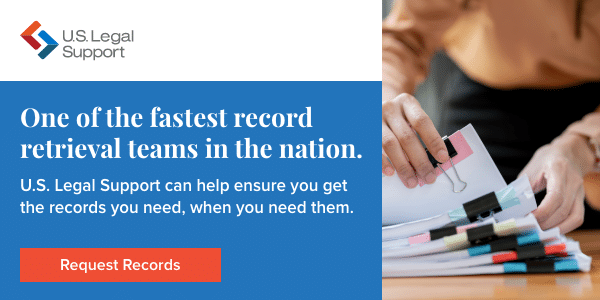How to Choose a Record Retrieval Partner

Record retrieval is an integral part of any legal case, giving attorneys access to accurate and up-to-date information on which to base their arguments. Preparing records for a case or legal matter requires carefully collecting and operationalizing documents in a secure, efficient manner that complies with applicable regulations. Only the best partners do that.
Below, we’ll provide some context about why record retrieval processes matter, then dive into the biggest factors to consider among service providers and how the decision can impact your cases.
Why Record Retrieval is Essential in Legal Cases
Record retrieval is imperative because records are one of the ways key information used for evidence or other purposes officially enters a courtroom or other legal arena. If records aren’t retrieved and managed in accordance with applicable laws and best practices, a judge or other authority might elect to dismiss or suppress the information they hold. This could be the difference between making a convincing argument based on the data and simply not having data to make any points about. Records can prove innocence, location, motivation, and more.
Additionally, cases that need specific data, like medical records housing sensitive information, are regulated via laws like the Healthcare Insurance and Portability Act (HIPAA). Breaking these kinds of rules through a careless retrieval process can lead to a medical records breach and fines of up to $50K per incident.1
Factors to Consider When Choosing a Record Retrieval Partner
Given the importance of effective record retrieval, it’s imperative to work with a partner that delivers the qualities you need for a specific case. However, this can vary from firm to firm.
Regardless of that expected variance, here are the factors all firms should be considering:
- Reliability and accuracy – Records need to meet local jurisdictions’ qualifications for relevance and quality to be admissible in a case, lest they be dismissed or suppressed.
- Security and confidentiality – Records, collection processes, and data storage also need to be protected to ensure privacy rights and other sensitivity requirements are upheld.
- Compliance with regulatory standards – Certain kinds of information may be subject to regulations like HIPAA or SOC 2, which retrieval services need to account for proactively.
- Turnaround time and efficiency – Records need to be retrieved within tight timeframes, and retrieval partners with swifter turnarounds provide more time to prepare effectively.
The best record retrieval partners ensure reliability, security, compliance, and efficiency.
Evaluating Technology and Support from Providers
Another critical aspect to evaluate when comparing record retrieval service providers is how their technological platforms stack up to each other. The ideal record retrieval platform should give all lawyers and other end-users fast and easy access to the information they need. All types of medical records should be available via a secure and frictionless platform.
Additionally, ideal retrieval partners should provide technical support to legal teams and/or any of their end clients who will access the platform. Demonstrations and tutorials act as baseline requirements, and the best providers also have plenty of availability for one-on-one support.
Cost Considerations for Record Retrieval Services
Yet another consideration that no legal team can afford to overlook is the cost of a given record retrieval process.
Many factors contribute to pricing, such as the specific kinds of records requested, their relative size, complexity, and sensitivity, and the communication and logistical hurdles facing the retrieval team. In many instances, these factors converge to make it challenging for a service to provide a stable per-record cost, and pricing for an overarching case or procedure often comes down to a bespoke, project-by-project model.
You should also be cautious about suspiciously low estimates when comparing competitors. A relatively low cost could belie a carefree (careless) approach, which elevates reliability, security, compliance, and efficiency concerns. Be sure to balance cost against service quality.
Why Choosing the Right Partner Impacts Case Outcomes
Picking the right record retrieval partner is important because of how critical records are to legal proceedings and cases. A retrieval service that fails to produce records reliably, securely, and quickly can lead to delays or inaccuracies in a case, which can result in poor outcomes or costs to clients.
Another element related to accuracy and attention to detail ties back to the issue of regulatory compliance noted above. Failure to notice and address a noncompliance issue can lead to a legal team needing to pay fines or devote significant efforts to required reporting. The HIPAA Breach Notification Rule requires reporting to impacted parties, government offices, and local media outlets with large breaches.2 This is costly and can result in reputational damage, as well. Thus, it’s important to choose a retrieval service that ensures HIPAA compliance for law firms.
Perfect Your Record Retrieval with U.S. Legal Support
Ultimately, it’s important to pick the right record retrieval partner because the records used for a legal dispute can make the difference between achieving the best outcome or falling short. So, ensuring reliability, security, compliance, and efficiency maximizes your chance at success.
U.S. Legal Support has been helping lawyers and legal teams collect and act upon records for the better part of three decades. We’ll help your team optimize its record retrieval with ease. Learn more about our medical record retrieval services for lawyers and insurance companies.
To learn more about our medical record retrieval and other services, get in touch today.
Sources:
- The HIPAA Journal. What are the Penalties for HIPAA Violations? https://www.hipaajournal.com/what-are-the-penalties-for-hipaa-violations-7096/
- U.S. Department of Health and Human Services. Breach Notification Rule. https://www.hhs.gov/hipaa/for-professionals/breach-notification/index.html

Editoral Policy
Content published on the U.S. Legal Support blog is reviewed by professionals in the legal and litigation support services field to help ensure accurate information. The information provided in this blog is for informational purposes only and should not be construed as legal advice for attorneys or clients.


